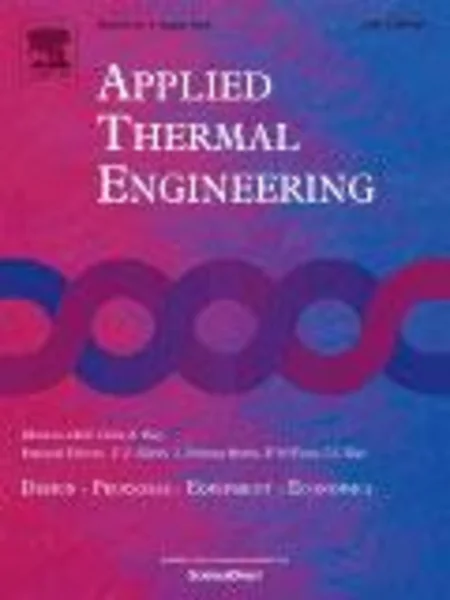-
enhancement of lng plant propane cycle through waste heat powered absorption cooling
جزئیات بیشتر مقاله- تاریخ ارائه: 1392/01/01
- تاریخ انتشار در تی پی بین: 1392/01/01
- تعداد بازدید: 584
- تعداد پرسش و پاسخ ها: 0
- شماره تماس دبیرخانه رویداد: -
in liquefied natural gas (lng) plants utilizing sea water for process cooling, both the efficiency and production capacity of the propane cycle decrease with increasing sea water temperature. to address this issue, several propane cycle enhancement approaches are investigated in this study, which require minimal modification of the existing plant configuration. these approaches rely on the use of gas turbine waste heat powered water/lithium bromide absorption cooling to either (i) subcool propane after the propane cycle condenser, or (ii) reduce propane cycle condensing pressure through pre-cooling of condenser cooling water. in the second approach, two alternative methods of pre-cooling condenser cooling water are considered, which consist of an open sea water loop, and a closed fresh water loop. in addition for all cases, three candidate absorption chiller configurations are evaluated, namely single-effect, double-effect, and cascaded double- and single-effect chillers. the thermodynamic performance of each propane cycle enhancement scheme, integrated in an actual lng plant in the persian gulf, is evaluated using actual plant operating data. subcooling propane after the propane cycle condenser is found to improve propane cycle total coefficient of performance (copt) and cooling capacity by 13% and 23%, respectively. the necessary cooling load could be provided by either a single-effect, double-effect or cascaded and single- and double-effect absorption refrigeration cycle recovering waste heat from a single gas turbine operated at full load. reducing propane condensing pressure using a closed fresh water condenser cooling loop is found result in propane cycle copt and cooling capacity enhancements of 63% and 22%, respectively, but would require substantially higher capital investment than for propane subcooling, due to higher cooling load and thus higher waste heat requirements. considering the present trend of short process enhancement payback periods in the natural gas industry, subcooling propane after the propane cycle condenser is recommended as the preferred option to boost propane cycle performance.
حوزه های تحت پوشش رویداد
مقالات جدیدترین رویدادها
-
استفاده از تحلیل اهمیت-عملکرد در ارائه الگوی مدیریت خلاقیت سازمانی و ارائه راهکار جهت بهبود
-
بررسی تاثیر ارزش وجوه نقد مازاد بر ساختار سرمایه شرکت های پذیرفته شده در بورس اوراق بهادار تهران
-
بررسی تأثیر سطح افشای ریسک بر قرارداد بدهی شرکت های پذیرفته شده در بورس اوراق بهادار تهران
-
بررسی تأثیر رتبه بندی اعتباری مبتنی بر مدل امتیاز بازار نوظهور بر نقد شوندگی سهام با تأکید بر خصوصی سازی شرکت ها
-
تأثیر آمیخته بازاریابی پوشاک ایرانی بر تصویر ذهنی مشتری پوشاک ایرانی (هاکوپیان)
-
بررسی رابطه هوش هیجانی با سبک های رهبری تحولی، تبادلی و آزاد گذار مورد مطالعه : بیمارستان های دولتی شهر اهواز
-
جایگاه و نقش فعالی تهای عملی (کارآموزی) در برنامه های درسی رشته های علوم انسانی
-
دل نیارامد به گفتار دروغ (بررسی صدق در مثنوی)
-
تحلیل چندفرکتالی نوسانات روندزدایی شده جریان رودخانه صوفی چای
-
مروری بر استفاده از لایه های تقویت کننده جهت کاهش اثر زلزله در محل های دفن زباله
مقالات جدیدترین ژورنال ها
-
مدیریت و بررسی افسردگی دانش آموزان دختر مقطع متوسطه دوم در دروان کرونا در شهرستان دزفول
-
مدیریت و بررسی خرد سیاسی در اندیشه ی فردوسی در ادب ایران
-
واکاوی و مدیریت توصیفی قلمدان(جاکلیدی)ضریح در موزه آستان قدس رضوی
-
بررسی تاثیر خلاقیت، دانش و انگیزه کارکنان بر پیشنهادات نوآورانه کارکنان ( مورد مطالعه: هتل های 3 و 4 ستاره استان کرمان)
-
بررسی تاثیر کیفیت سیستم های اطلاعاتی بر تصمیم گیری موفق در شرکتهای تولیدی استان اصفهان (مورد مطالعه: مدیران شرکتهای تولیدی استان اصفهان)
-
الگوی پیشنهادی نظام مند برای سیاست گذاری در آموزش و پرورش
-
مطالعه تطبیقی نظریه تقلید در باب هنر از دیدگاه فلسفه غرب و فلاسفه ایرانی اسلامی
-
بهداشت روح، ضرورت و اهمیت آن
-
بررسی رابطه بین عوامل شخصی و سازمانی افراد بر توانمند سازی آنها از دیدگاه روانشناسان
-
evaluation of load-bearing performance of existing cast steel node




سوال خود را در مورد این مقاله مطرح نمایید :